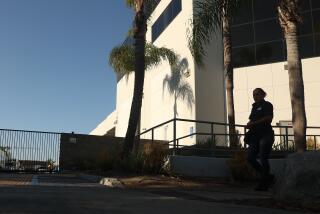The Hole Picture : A new law aimed at protecting the ozone requires that air-conditioning repairmen capture Freon gas.
- Share via
It is 101 degrees in the Conejo Valley and there is no relief in sight. You reach for the air conditioner switch and discover that it isn’t working. Instead, you find yourself reaching for the phone book in search of a repair service.
But how to choose one? There is one thing I recommend you consider. “Does the repair service have the equipment to capture the Freon gas during the repair?” If the repair person on the phone says yes, go ahead and deal with them. If the answer is negative or evasive, call someone else.
What we’re dealing with here is nothing less than the famous and dreaded “ozone hole.” Freon--also known as CFC or chlorofluorocarbon--is used in our home and office air-conditioning compressors. When the unit leaks or when it is improperly serviced, Freon goes into the atmosphere, thus making that “ozone hole” bigger.
Record heat in Southern California and the scenes on TV of the GOP delegates trying to avoid being outdoors in Houston for more than seconds at a time have reminded us that modern life in summertime without AC can be impossible.
But in our frenzy to escape humidity and heat by using air conditioning, we have all created a monster--and it’s eating up the layer of ozone in the atmosphere that protects us from the sun’s dangerous ultraviolet radiation.
Last Sunday, PBS-TV had a sobering hour about this dilemma. They showed children in countries, where the ozone layer is already severely damaged, being taught that the sun is “the enemy.” In Australia they are urged to play outside only if they are covered up with hats and long sleeves.
Last month, the U. S. Environmental Protection Agency published a new regulation to protect us from this threat. It affects the local area because we all use air conditioning and that means we all use Freon. And beginning in July there are special rules that air-conditioning repair people have to follow when dealing with this substance.
Their obligation is to “capture” it during any repair visit that involves moving or repairing your cooling unit. Since July, service trucks have been required to carry a sort of siphon--I once called it a “vampire” in a column about automobile air conditioning. This new eco-gizmo is the solution to the old practice of just venting the Freon into the atmosphere during repairs.
That’s what all repair people are supposed to do. But the law is just being phased in and not everyone is properly equipped. You should ask about it before having them come over. There will be an increase in the price since the last visit because equipment isn’t cheap. But it’s worth it if the result is reducing the size of the ozone hole.
Our involvement should go beyond just calling the repair people when something goes wrong; home air conditioning should get a spring checkup. Freon leaks out from the best of equipment--slowly, constantly and silently. If your home air conditioning doesn’t seems to be cooling as well this summer, it’s probably because of these minute leaks.
My personal theory is that the EPA regulation to “capture” Freon can be traced to the headline news that the ozone hole had “reached” Kennebunkport, Me. Right away all sorts of ozone hole legislation found its way into the new Clean Air Act that President Bush is so proud of signing.
But before we get too cynical about such things, we should examine our own role in all this. How long has it been since you had a routine service check on your home AC? Is yours leaking Freon while you’re reading this. Who are you going to call?
* FYI
Some Ventura County air-conditioning repair companies that are using the new procedures to protect the ozone layer from damage from Freon gas emissions:
* Central Air Conditioning: 497-7075
* Climate Masters: 582-0288
* George Brazil, four locations: 582-0584, 529-8522, 497-4167, 498-7158
For a copy of “Air Conditioning Refrigerants and the Ozone Layer: What Homeowners Need to Know,” contact Ellen Larson of Air Conditioning Contractors of America (202) 483-9370.
More to Read
Sign up for Essential California
The most important California stories and recommendations in your inbox every morning.
You may occasionally receive promotional content from the Los Angeles Times.













